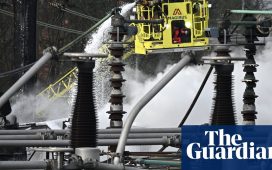Unlock the Editor’s Digest for free
Roula Khalaf, Editor of the FT, selects her favourite stories in this weekly newsletter.
The UK’s energy regulator has cleared Drax, the country’s largest power station, of accusations that it is environmentally unsustainable, even as it found holes in the company’s supply chain data.
After a 16-month investigation, Ofgem said Drax did not have adequate data on the sustainability of the wood it imported to burn in its biomass units in 2021-22, and ordered a full independent audit of its supply chain for last year.
Drax will pay £25mn into Ofgem’s Voluntary Contributions Fund to atone for the breach.
“Drax has accepted that it had weak procedures, controls and governance which resulted in inaccurate reporting of data,” said Jonathan Brearley, Ofgem’s chief executive.
Nevertheless, Ofgem said the misreported data had been “technical in nature” and there was no evidence that Drax’s biomass was unsustainable, or that the company should not have received the £548mn in clean energy subsidies it was paid last year.
“It is welcome that Ofgem has found no evidence that our biomass failed to meet the sustainability criteria of the Renewables Obligation (RO) scheme, nor that the ROCs we received for the renewable power we produced had been provided incorrectly,” said Will Gardiner, Drax’s chief executive.
However, the findings of the investigation will provide more ammunition for campaigners, who have rubbished Drax’s claims that burning imported wood from Canada and the US is both carbon neutral and sustainable.
Biomass accounts for 11 per cent of power generation in the UK, but its use rests on assurances that the wood involved is from sustainably managed forests with ongoing replanting. The National Audit Office this year cast doubt on the trustworthiness of the UK monitoring process.
“This ruling shows how difficult it is to prove that burning wood from forests is good for the environment,” said Matt Williams, at the National Resources Defense Council. “There’s one simple reason for that — it isn’t.”
But analysts said the conclusion of Ofgem’s investigation will pave the way for the government to extend the subsidy regime that is due to expire in 2027.
Subsidies accounted for an estimated 13 per cent of Drax’s £7.5bn power generation revenues last year, according to research platform Visible Alpha.
“The ending of the Ofgem investigation is a clear positive for Drax,” said Alexander Wheeler at RBC Capital Markets. “This announcement also confirms no issues with biomass sustainability, which is clearly important as Drax continues its discussions with the government,” he added.
Drax shares rose just under 1 per cent in early London trading to 660p and are up by more than a third so far this year.
On Tuesday, 41 environmental groups from around the world sent an open letter to Ed Miliband, the energy secretary, to urge him to scrap plans for further support for the company.










